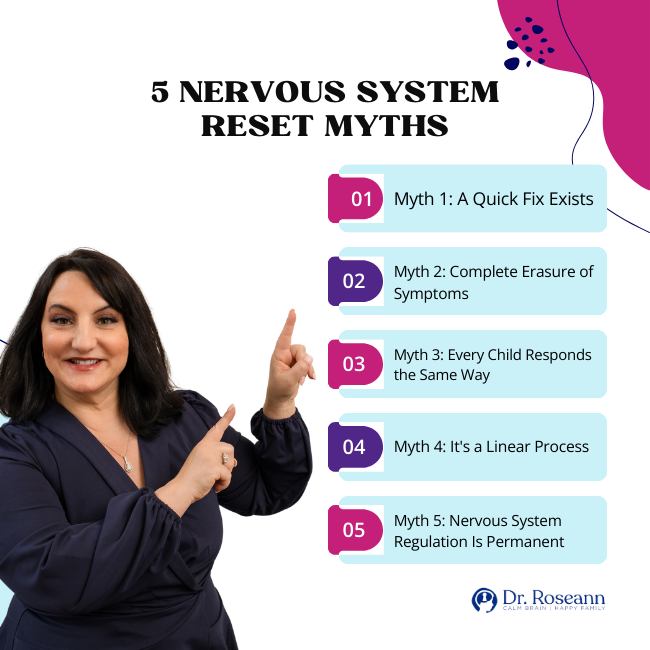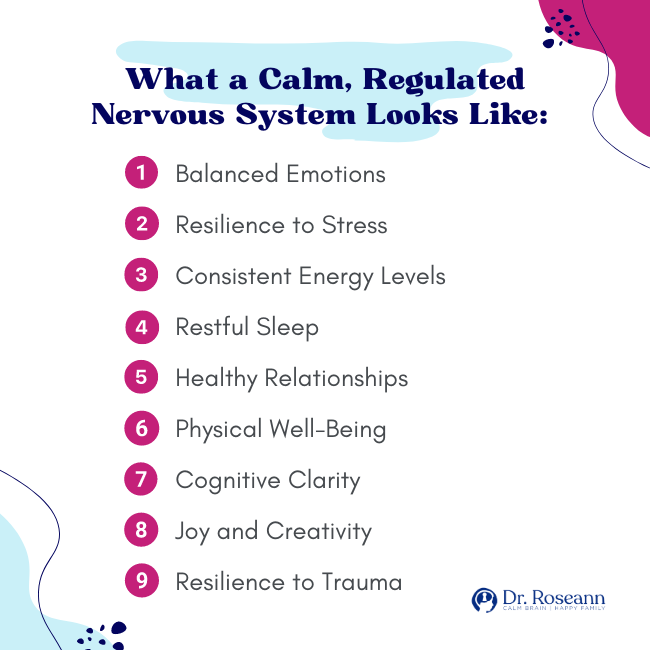As parents on a journey to support your child's nervous system healing, you may have come across various claims and misconceptions about the possibility of resetting your child's nervous system. In this section, we aim to provide clarity and debunk common myths surrounding this topic, allowing you to have realistic expectations and a better understanding of what is achievable in terms of nervous system regulation and healing.

Myth 1: A Quick Fix Exists
It's essential to debunk the notion that there is a quick fix or a one-size-fits-all solution for resetting a child's nervous system. Nervous system dysregulation is a complex issue influenced by various factors, including genetics, environment, and life experiences. While there are effective interventions and therapies, progress may take time and dedication.
Myth 2: Complete Erasure of Symptoms
Another common misconception is that nervous system dysregulation can be completely eradicated, leading to the total elimination of symptoms. In reality, the goal is not always symptom elimination but rather symptom management and reduction. Your child's nervous system may achieve regulation, but some challenges might persist to varying degrees.
Myth 3: Every Child Responds the Same Way
Children are unique, and what works for one child may not work for another. It's essential to understand that there is no one-size-fits-all approach to nervous system regulation. Each child's journey is individual (especially if they have neurodivergent conditions such as ADHD, Autism, LD, etc.), and interventions should be tailored to their specific needs, preferences, and responses.
Myth 4: It's a Linear Process
Nervous system regulation is not always a linear process, and setbacks or fluctuations may occur. It's crucial to acknowledge that progress may have ups and downs, but these fluctuations do not necessarily indicate failure. They are a natural part of the healing process.
Myth 5: Nervous System Regulation Is Permanent
While significant progress can be made in regulating a child's nervous system, it's important to understand that this regulation may require ongoing support and maintenance. Factors such as stressors, limbic activation, life changes, and developmental stages can impact a child's nervous system, and periodic adjustments may be needed.
Reality: Nervous System Regulation Is Achievable
Debunking these myths does not diminish the potential for positive change and healing. Nervous system regulation is achievable through appropriate interventions, therapies, and dedicated support. By understanding that it's a journey with its ups and downs, you can empower yourself to navigate your child's path to a regulated nervous system with realistic expectations and unwavering determination.
Understanding What a “Reset” Means for Children
The concept of “resetting” a child's nervous system can be a bit misleading, and it's crucial to clarify what this term truly entails. When we talk about resetting the nervous system in children with behavioral and neurodevelopmental issues, we're referring to the process of helping the nervous system return to a state of balance and regulation. This doesn't mean erasing all challenges or symptoms but rather promoting a healthier and more stable functioning of the nervous system.
It's essential to manage expectations about what is achievable through this process. Nervous system regulation is a journey, and its outcomes can vary from one child to another. Some children may experience significant improvements in their symptoms and overall well-being, while others may have more modest changes. The goal is to enhance a child's quality of life and provide them with better tools to navigate their unique challenges.
What Science Says About Nervous System Regulation in Children
Scientific research has made significant strides in understanding nervous system regulation in children with behavioral and neurodevelopmental issues. This body of research provides valuable insights that can help us separate fact from fiction and address common misconceptions.
Studies have shown that various interventions and therapies can positively impact a child's nervous system, leading to improvements in their emotional regulation, behavior, and overall functioning. These interventions may include therapy, counseling, lifestyle modifications, and holistic approaches like neurofeedback and PEMF therapy.
One crucial finding is that early intervention can make a substantial difference in a child's nervous system regulation. Identifying and addressing nervous system dysregulation in the early stages can lead to more effective outcomes and a higher likelihood of symptom management.
Moreover, scientific research emphasizes the importance of personalized approaches. Since each child is unique, tailored interventions that consider the child's specific needs, strengths, and challenges tend to yield the most favorable results.
In the following section, we delve deeper into the scientific evidence surrounding nervous system regulation in children, providing you with evidence-based insights to guide you on your child's journey toward a regulated nervous system.
What Does a Regulated Nervous System Look Like?
A regulated nervous system exhibits several key characteristics that contribute to an individual's overall sense of well-being and emotional stability.
Here are the hallmarks of a calm and regulated nervous system:

- Balanced Emotions:
- Emotional regulation is a cornerstone of a regulated nervous system. Individuals with a well-regulated nervous system can experience a wide range of emotions without becoming overwhelmed.
- They can recognize, understand, and appropriately respond to their emotions, whether positive or negative, without extreme mood swings.
- Resilience to Stress:
- A regulated nervous system enables individuals to manage stress effectively. They can face challenging situations with composure and adaptability.
- Stressors are less likely to trigger a fight-or-flight response, allowing for a more measured and controlled reaction.
- Consistent Energy Levels:
- Those with a regulated nervous system often experience consistent energy levels throughout the day.
- They can maintain focus and productivity without experiencing extreme fatigue or energy or focus crashes.
- Restful Sleep:
- Quality sleep is a hallmark of a regulated nervous system. Individuals can fall asleep easily, stay asleep, and wake up feeling refreshed.
- Sleep disturbances, such as insomnia or frequent anxious awakenings , are less common.
- Healthy Relationships:
- Regulated individuals tend to have healthier relationships due to their ability to communicate effectively and empathize with others.
- They can navigate conflicts constructively and maintain emotional connections.
- Physical Well-Being:
- A calm nervous system contributes to physical well-being, as it reduces the risk of stress-related health issues.
- Individuals may experience fewer tension-related aches, pains, and digestive problems.
- Cognitive Clarity:
- Regulated individuals often have improved cognitive function, including enhanced memory, attention, and problem-solving skills.
- They can think clearly and make decisions with greater ease.
- Joy and Creativity:
- A regulated nervous system fosters a sense of joy and creativity.
- Individuals can experience pleasure from simple activities and often find inspiration in various aspects of life.
- Resilience to Trauma:
- While no one is immune to life's challenges, a regulated nervous system can provide resilience when facing trauma or adversity.
- Individuals may recover more effectively and develop coping mechanisms to navigate difficult experiences.
A regulated nervous system is a valuable asset for overall well-being. While it's important to remember that everyone's nervous system can fluctuate due to life's demands, practicing self-regulation skills and seeking support when needed can contribute to a more consistently calm and regulated nervous system. Ultimately, nurturing your nervous system can lead to a happier, healthier, and more balanced life.
Treatment Options for Dysregulated Nervous Systems in Children
Exploring various treatment options is essential when addressing nervous system dysregulation in children with behavioral and neurodevelopmental challenges.
These treatments are typically tailored to the child's specific needs and may include the following:
- Therapy and Counseling: Behavioral therapy, cognitive-behavioral therapy (CBT), play therapy, and occupational therapy are among the many therapeutic approaches available. These therapies help children develop coping strategies, improve emotional regulation, and enhance their overall well-being.
- Lifestyle Changes: Modifying your child's daily routines, diet, and physical activity can have a significant impact on their nervous system regulation. Encouraging healthy habits, such as regular exercise and a balanced diet, can contribute to improved emotional and physical health.
- Holistic Approaches: Holistic methods like neurofeedback and PEMF (Pulsed Electromagnetic Field) therapy offer non-invasive ways to support nervous system regulation. These approaches focus on enhancing brain function and emotional balance.
- Parental Involvement: In many cases, involving parents in the therapeutic process is crucial. Parents can learn strategies to support their child's nervous system regulation, manage challenging behaviors, and create a nurturing home environment.
Stress, clinical issues and daily life cause our autonomic nervous system to activate. The good news is that there are effective ways to naturally combat this activation. It does require parents to share their calm, teach coping skills and adopt a healthy lifestyle where mental wellness is a priority.
If you are ready to create change for yourself at work or for your child at school or home, then our BrainBehaviorReset™ Program is your next step.
Citations:
American Academy of Pediatrics. (2021). Addressing Early Childhood Emotional and Behavioral Problems. Pediatrics.
Chervonsky, E., & Hunt, C. (2019). Emotion regulation, mental health, and social wellbeing in a young adolescent sample: A concurrent and longitudinal investigation. Emotion, 19(2), 270-282. https://pubmed.ncbi.nlm.nih.gov/29697988/
Dr. Roseann Capanna-Hodge was the featured expert in this Healthline article:
Healthline. (2019.). Self-regulation skills. Retrieved from https://www.healthline.com/health/childrens-health/self-regulation-skills
Dr. Roseann Capanna-Hodge is a licensed mental health expert that is frequently cited in the media:
- CBS2 New York (Article) Experts Offer Tips On How To Help Children Deal With Anxiety.
- Parade Want to Know How to Overcome Social Anxiety? We've got Help!.
Are you looking for SOLUTIONS for your struggling child or teen?
Dr. Roseann and her team are all about science-backed solutions, so you are in the right place!
Grab your complimentary copy of
147 Therapist-Endorsed Self-Regulation Strategies for Children: A Practical Guide for Parents
Dr. Roseann is a Children’s Mental Health Expert and Licensed Therapist who has been featured in/on hundreds of media outlets including The Mel Robbins Show, CBS, NBC, PIX11 NYC, Today, FORBES, CNN, The New York Times, The Washington Post, Business Insider, Women’s Day, Healthline, CNET, Parade Magazine and PARENTS. FORBES called her, “A thought leader in children’s mental health.”

She coined the terms, “Re-entry panic syndrome” and “eco-anxiety” and is a frequent contributor to media on mental health.
Dr. Roseann Capanna-Hodge has three decades of experience in working with children, teens and their families with attention-deficit hyperactivity disorder (ADHD), autism, concussion, dyslexia and learning disability, anxiety, Obsessive Compulsive Disorder (OCD), depression and mood disorder, Lyme Disease, and PANS/PANDAS using science-backed natural mental health solutions such as supplements, magnesium, nutrition, QEEG Brain maps, neurofeedback, PEMF, psychotherapy and other non-medication approaches.
She is the author of three bestselling books, It’s Gonna Be OK!: Proven Ways to Improve Your Child's Mental Health, The Teletherapy Toolkit, and Brain Under Attack. Dr. Roseann is known for offering a message of hope through science-endorsed methods that promote a calm brain.
Her trademarked BrainBehaviorResetⓇ Program and It’s Gonna be OK!Ⓡ Podcast has been a cornerstone for thousands of parents facing mental health, behavioral or neurodevelopmental challenges.
She is the founder and director of The Global Institute of Children’s Mental Health, Neurotastic™Brain Formulas and Dr. Roseann Capanna-Hodge, LLC. Dr. Roseann is a Board Certified Neurofeedback (BCN) Practitioner, a Board Member of the Northeast Region Biofeedback Society (NRBS), Certified Integrative Mental Health Professional (CIMHP) and an Amen Clinic Certified Brain Health Coach. She is also a member of The International Lyme Disease and Associated Disease Society (ILADS), The American Psychological Association (APA), Anxiety and Depression Association of America (ADAA) National Association of School Psychologists (NASP), International OCD Foundation (IOCDF).
© Roseann-Capanna-Hodge, LLC 2023










